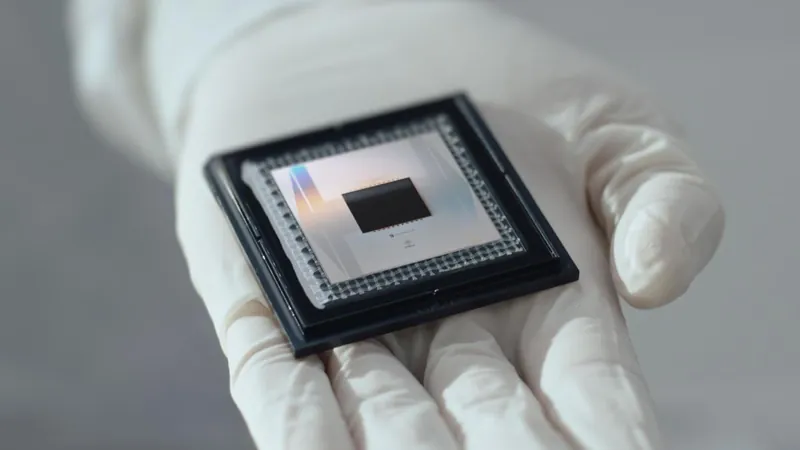
Google’s ‘Mind-Boggling’ Quantum Computing Chip: A Leap Towards the Future!
2024-12-09
Author: Nur
Google’s ‘Mind-Boggling’ Quantum Computing Chip: A Leap Towards the Future!
In a groundbreaking announcement, Google has introduced its latest quantum computing chip, whimsically named "Willow." This cutting-edge chip boasts the incredible capability to solve complex problems in a mere five minutes—problems that would require the world’s fastest supercomputers an unfathomable 10 septillion years (that’s 10,000,000,000,000,000,000,000,000 years) to tackle!
This remarkable advancement kicks off a new era in the realm of quantum computing, a field that leverages the perplexing principles of particle physics to potentially create immensely powerful computers. Google asserts that Willow represents key breakthroughs and is a significant step toward realizing a practical large-scale quantum computer.
Despite the excitement, experts caution that Willow is, for now, primarily experimental, and the quest for a fully practical quantum computer capable of solving numerous real-world problems remains years—and potentially billions of dollars—away.
Understanding Quantum Computing
Unlike your everyday laptop or smartphone, quantum computers operate on the strange and fascinating principles of quantum mechanics. This unique approach allows them to tackle certain types of problems far faster than traditional computing systems. The implications of this technology are vast—quantum computers could revolutionize various fields, including drug development, and even help find solutions for next-generation battery technologies.
However, the future doesn’t come without its challenges. There are legitimate concerns regarding the potential misuse of quantum computers, particularly in breaking encryption standards that protect our sensitive data. In response, tech giants like Apple are preemptively making their encrypted services "quantum-proof" to shield user data from future quantum threats.
Significant Progress Yet Room for Growth
Hartmut Neven, head of Google’s Quantum AI lab and the self-proclaimed "chief optimist" behind Willow, states that while it will be used for some practical applications in the near future, we should temper expectations. The first truly useful applications of quantum computing won't materialize until at least the end of this decade.
For now, the initial applications will focus on simulating systems where quantum effects play an essential role. Imagine creating advanced simulations for the design of nuclear fusion reactors or enhancing pharmaceutical drug formulations—this is just a glimpse of what could be achieved with Willow.
Experts like Professor Alan Woodward from Surrey University acknowledge that while Willow is a substantial advancement, it should not be overstated as a panacea for all computing challenges. He points out the necessity of cautious interpretation of Willow's benchmark achievements, as Google’s performance metrics may not fully encapsulate the broader utility of quantum computing.
Nevertheless, the development of quantum error correction is a significant milestone in itself! Traditionally, quantum chips experienced an increase in error rates as the number of qubits expanded. However, Google’s research team claims to have made headway against this barrier, successfully lowering the error rate even as they scaled up the qubit count.
Global Race and Future Prospects
Willow was produced in Google's innovative, purpose-built facility in California, highlighting the immense investment in quantum technology. Countries worldwide are ramping up their quantum computing initiatives—we recently saw the UK establish the National Quantum Computing Centre (NQCC), which aims to steer advancements in this exciting field.
As of now, the UK boasts 50 quantum-focused businesses, collectively attracting about £800 million in funding and employing over 1,300 individuals. The ultimate vision includes optimizing logistical tasks, such as cargo distribution and energy routing across national grids.
Adding to this momentum, researchers from Oxford University and Osaka University recently released a study on ultra-low error rates in a trapped-ion qubit. Their findings showcase an alternative approach to quantum computing, with a promising potential to operate at room temperature—setting itself apart from Google's ultra-cold processing requirements.
With every stride in quantum computing, the world inches closer to harnessing the true power of this "mind-boggling" technology. What awaits us in the not-so-distant future? Stay tuned for updates as the quantum revolution unfolds!


 Brasil (PT)
Brasil (PT)
 Canada (EN)
Canada (EN)
 Chile (ES)
Chile (ES)
 España (ES)
España (ES)
 France (FR)
France (FR)
 Hong Kong (EN)
Hong Kong (EN)
 Italia (IT)
Italia (IT)
 日本 (JA)
日本 (JA)
 Magyarország (HU)
Magyarország (HU)
 Norge (NO)
Norge (NO)
 Polska (PL)
Polska (PL)
 Schweiz (DE)
Schweiz (DE)
 Singapore (EN)
Singapore (EN)
 Sverige (SV)
Sverige (SV)
 Suomi (FI)
Suomi (FI)
 Türkiye (TR)
Türkiye (TR)